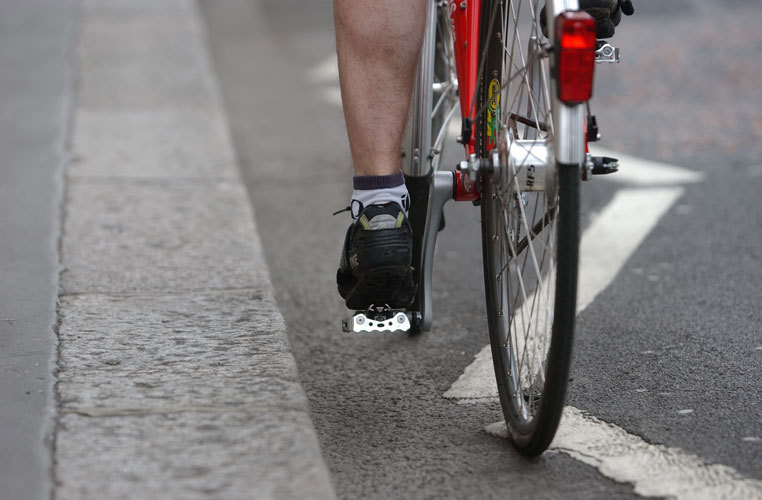CTC WELCOMES CALL FOR 20MPH SPEED LIMIT

National cycling organisation CTC has strongly welcomed calls from an influential group of MPs for the Government to increase the number of 20 mph speed limits, and for road safety targets to be set in the context of the need to promote healthy and sustainable transport.
The Transport Select Committee?s report Ending the Scandal of Complacency: Road Safety beyond 2010 comes out as the Government starts work on a new Road Safety Strategy for the next decade.
A key recommendation of the report is that 'local authorities be given the powers and resources to introduce 20 mph limits much more widely'.
Roger Geffen, CTC Campaigns and Policy Manager, said, ?Making 20 mph limits the norm for most urban streets would not only have huge road safety benefits for everyone, but would also encourage more people to walk and cycle, and allow their children to do so. The evidence also suggests it has strong benefits for local economies and people?s quality of life and, above all, that they are what 75% of the public wants.?
The report urges the Government to ensure that its Road Safety Strategy is integrated with wider objectives, particularly the need to promote sustainable travel.
The report cites CTC?s evidence that some local authorities are unwilling to promote cycling for fear that more cycling would jeopardise their targets to reduce road casualties. CTC provided the Committee with strong evidence that more cycling taking place actually makes cycling safer.
The Committee said, ?It is essential that, at both national and local level, casualty reduction targets are seen in the context of promoting sustainable transport?. It recommends that the Government ?ensure that road safety is seen as relevant in other policy areas and that road safety policies do not have unintended consequences on other important objectives, such as improving public health by encouraging walking, cycling and play.?
Get The Leadout Newsletter
The latest race content, interviews, features, reviews and expert buying guides, direct to your inbox!
Geffen said, ?The use of simplistic casualty reduction targets creates perverse incentives for local authority road safety officers to oppose pro-cycling measures for fears that this could increase casualties. In fact the opposite is the case, and the Government must now set targets which encourage more as well as safer cycling?.
The committee has suggested that the Government conduct a British Road Safety Survey, including studying the fears of pedestrians and cyclists. Such a survey would help establish how great a part ?perception of danger? plays in preventing more people cycling.
CTC believes that fear of traffic is the greatest barrier to more people taking up cycling and a key part of any future road safety strategy should be reducing this fear, by better training, road law enforcement, and reducing traffic speeds.
TRAINING RECOMMENDATIONS
CTC is pleased that the Committee has taken the Government to task for failing to consider how cycle training could contribute to the training of novice drivers. Recent consultation proposals failed to discuss how to improve driver awareness and understanding of how they drive with consideration for cyclists? safety, or to include any walking or cycling groups in the original consultation.
CTC also welcomes the report?s call for stronger Home Office involvement in traffic law and roads policing. The Committee also backed CTC?s suggestion that cyclists who break the law could be offered cycle training as an alternative to a fine, in the same way that drivers who speed are in some circumstances offered speed awareness or driver retraining courses rather than a fine and penalty point endorsement.
Statistics show that illegal cycling poses very little actual risk either to cyclists or other road users. However, CTC does acknowledge that illegal cycling intimidates pedestrians, especially the more vulnerable, and needs to be addressed in a proportionate manner.
Geffen said, ?We are strongly in favour of more road traffic policing, as cyclists are far more likely to be the victims than the perpetrators of irresponsible behaviour on the roads.?
?Illegal and inconsiderate cycling cannot be condoned, but cyclists are often faced with choices between what is safe and what is legal. Pavement cycling may occur because the cyclist has never had the training which would give them the confidence and skills to ride safely and legally on the roads. In some cases, cycle training would not only ?fit the crime? but help fix it as well.?
EXTERNAL LINK
CTC: www.ctc.org.uk

Thank you for reading 20 articles this month* Join now for unlimited access
Enjoy your first month for just £1 / $1 / €1
*Read 5 free articles per month without a subscription

Join now for unlimited access
Try first month for just £1 / $1 / €1
Founded in 1891, Cycling Weekly and its team of expert journalists brings cyclists in-depth reviews, extensive coverage of both professional and domestic racing, as well as fitness advice and 'brew a cuppa and put your feet up' features. Cycling Weekly serves its audience across a range of platforms, from good old-fashioned print to online journalism, and video.
-
 FDJ-Suez, SD Worx-Protime, Lidl-Trek confirmed for Tour of Britain Women as strong list of teams announced
FDJ-Suez, SD Worx-Protime, Lidl-Trek confirmed for Tour of Britain Women as strong list of teams announced18 teams set to take part in four-day WorldTour stage race
By Tom Thewlis
-
 Cyclists could face life sentences for killing pedestrians if new law passed in England and Wales
Cyclists could face life sentences for killing pedestrians if new law passed in England and WalesReckless cycling currently carries a maximum two-year jail term
By Tom Thewlis